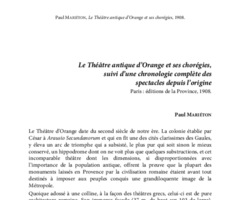Le Châlet
Opéra-comique en un acte.
A Swiss subject appeared to be rather in vogue for Christmas 1834 since, in the very same week as the premiere of this opera, two Tyrolian singers had come to give a demonstration of yodelling at Paris’s Théâtre des Variétés, while two Styrian singers were performing a similar repertory at the Salle de la Bourse. And, on the following 4 January, the weekly musical journal, Le Ménestrel, published the romance Doux Tyrol: “Heureux châlets, collines adorées…” (“Happy chalets, beloved hills…”). It is impossible, under these circumstances, not to hear Alpine echoes in the overture to Adam’s Le Châlet, and not to imagine the vocal effect referenced in the leaps of register required from Daniel, the wealthy farmer, from his opening aria: “Ô bonheur extrême, enfin elle m’aime…” (“Oh supreme happiness, at last she loves me”). Unfortunately for Daniel, the villagers have fooled him with a forged letter, and the lovely Bettly actually intends to remain fancy-free forever. It is not until a regiment of soldiers, commanded by Max, the young lady’s brother, wreaks havoc in her home that she decides to marry. And, even then, she expects the prepared contract to be invalid! Adam’s first success, Le Châlet, entered the annals of the genre’s history with a bang: the work was staged, on average, twenty times a year at the Opéra-Comique until the end of the 19th century, and the number of performances at that theatre even exceeded Auber’s Le Domino noir and Victor Massé’s Les Noces de Jeannette, only being overtaken by Boieldieu’s La Dame blanche and Hérold’s Le Pré aux Clercs. The work continued to remain famous owing to the bass aria “Vallons de l’Helvétie” (“Valleys of Helvetia”) which could be heard, for many years, echoing through the corridors of the Paris Conservatoire during the annual singing competitions. This classic aria was still sufficiently fashionable in the early 20th century to be recorded by Pol Plançon, Hector Dufranne, René-Antoine Fournets and Paul Aumonier, among others. Based on a singspiel by Goethe, the libretto was also translated and adapted by Donizetti for Naples, about a year after its first performance.

